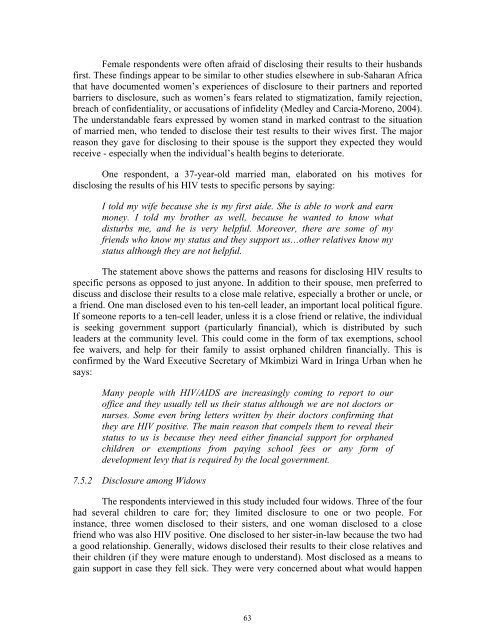social context of disclosing hiv test results: hiv testing in tanzania
social context of disclosing hiv test results: hiv testing in tanzania
social context of disclosing hiv test results: hiv testing in tanzania
You also want an ePaper? Increase the reach of your titles
YUMPU automatically turns print PDFs into web optimized ePapers that Google loves.
Female respondents were <strong>of</strong>ten afraid <strong>of</strong> <strong>disclos<strong>in</strong>g</strong> their <strong>results</strong> to their husbands<br />
first. These f<strong>in</strong>d<strong>in</strong>gs appear to be similar to other studies elsewhere <strong>in</strong> sub-Saharan Africa<br />
that have documented women’s experiences <strong>of</strong> disclosure to their partners and reported<br />
barriers to disclosure, such as women’s fears related to stigmatization, family rejection,<br />
breach <strong>of</strong> confidentiality, or accusations <strong>of</strong> <strong>in</strong>fidelity (Medley and Carcia-Moreno, 2004).<br />
The understandable fears expressed by women stand <strong>in</strong> marked contrast to the situation<br />
<strong>of</strong> married men, who tended to disclose their <strong>test</strong> <strong>results</strong> to their wives first. The major<br />
reason they gave for <strong>disclos<strong>in</strong>g</strong> to their spouse is the support they expected they would<br />
receive - especially when the <strong>in</strong>dividual’s health beg<strong>in</strong>s to deteriorate.<br />
One respondent, a 37-year-old married man, elaborated on his motives for<br />
<strong>disclos<strong>in</strong>g</strong> the <strong>results</strong> <strong>of</strong> his HIV <strong>test</strong>s to specific persons by say<strong>in</strong>g:<br />
I told my wife because she is my first aide. She is able to work and earn<br />
money. I told my brother as well, because he wanted to know what<br />
disturbs me, and he is very helpful. Moreover, there are some <strong>of</strong> my<br />
friends who know my status and they support us…other relatives know my<br />
status although they are not helpful.<br />
The statement above shows the patterns and reasons for <strong>disclos<strong>in</strong>g</strong> HIV <strong>results</strong> to<br />
specific persons as opposed to just anyone. In addition to their spouse, men preferred to<br />
discuss and disclose their <strong>results</strong> to a close male relative, especially a brother or uncle, or<br />
a friend. One man disclosed even to his ten-cell leader, an important local political figure.<br />
If someone reports to a ten-cell leader, unless it is a close friend or relative, the <strong>in</strong>dividual<br />
is seek<strong>in</strong>g government support (particularly f<strong>in</strong>ancial), which is distributed by such<br />
leaders at the community level. This could come <strong>in</strong> the form <strong>of</strong> tax exemptions, school<br />
fee waivers, and help for their family to assist orphaned children f<strong>in</strong>ancially. This is<br />
confirmed by the Ward Executive Secretary <strong>of</strong> Mkimbizi Ward <strong>in</strong> Ir<strong>in</strong>ga Urban when he<br />
says:<br />
Many people with HIV/AIDS are <strong>in</strong>creas<strong>in</strong>gly com<strong>in</strong>g to report to our<br />
<strong>of</strong>fice and they usually tell us their status although we are not doctors or<br />
nurses. Some even br<strong>in</strong>g letters written by their doctors confirm<strong>in</strong>g that<br />
they are HIV positive. The ma<strong>in</strong> reason that compels them to reveal their<br />
status to us is because they need either f<strong>in</strong>ancial support for orphaned<br />
children or exemptions from pay<strong>in</strong>g school fees or any form <strong>of</strong><br />
development levy that is required by the local government.<br />
7.5.2 Disclosure among Widows<br />
The respondents <strong>in</strong>terviewed <strong>in</strong> this study <strong>in</strong>cluded four widows. Three <strong>of</strong> the four<br />
had several children to care for; they limited disclosure to one or two people. For<br />
<strong>in</strong>stance, three women disclosed to their sisters, and one woman disclosed to a close<br />
friend who was also HIV positive. One disclosed to her sister-<strong>in</strong>-law because the two had<br />
a good relationship. Generally, widows disclosed their <strong>results</strong> to their close relatives and<br />
their children (if they were mature enough to understand). Most disclosed as a means to<br />
ga<strong>in</strong> support <strong>in</strong> case they fell sick. They were very concerned about what would happen<br />
63

















